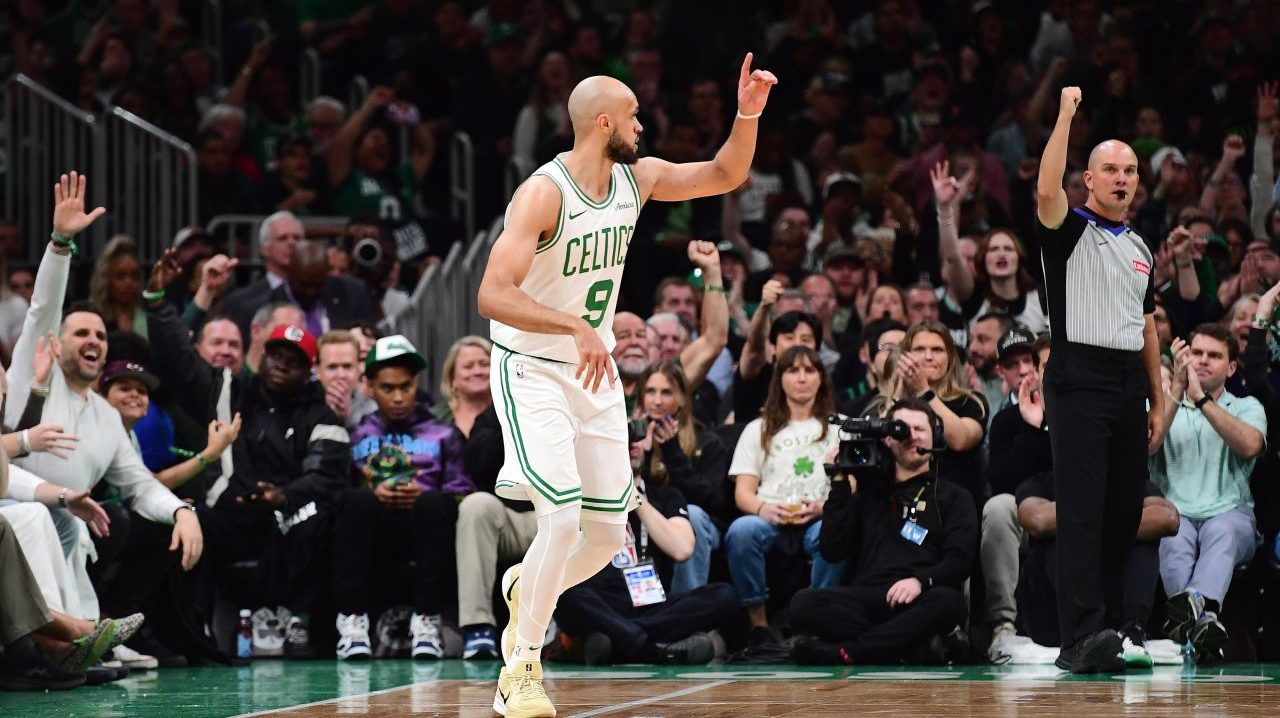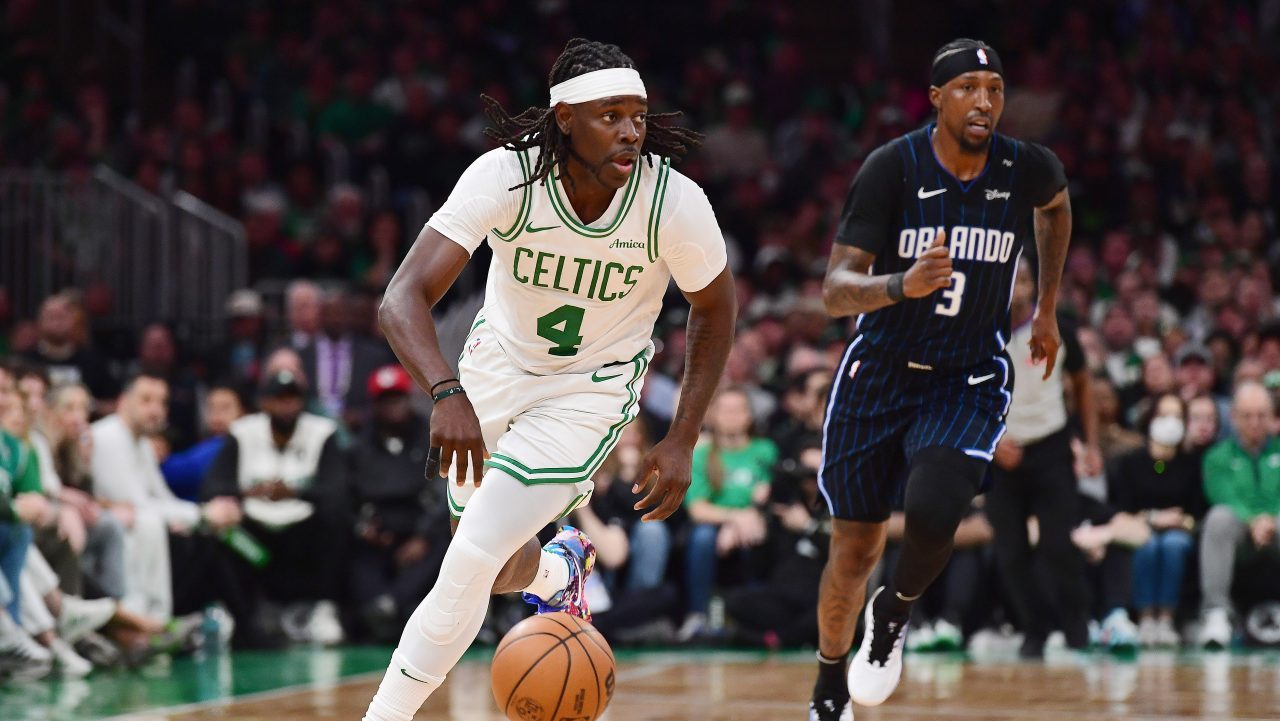After the Celtics blew their Game 2 lead, Michael Holley addressed the frustrations of the team and their reported postgame locker room blow up.
There’s a case to be made that, had the Boston Celtics slunk quietly out of their locker room on Thursday night, resigned to their 0-2 fate after coughing up a pair of double-digit leads to start the Eastern Conference finals, it’d be a heck of a lot more concerning than the apparently raucous nature of what actually transpired.
There was reportedly yelling. There was reportedly screaming. Some reports made it seem as if a WWE Hell in the Cell match had broken out before Marcus Smart stomped off into the night. The Athletic reported that Smart and Jaylen Brown were at the center of the commotion, while ESPN noted that Brad Stevens huddled some of the core members of his team later in the evening to hash everything out.
The moment is surely newsworthy but we’d counter that these sort of outburst happen pretty often in pro sports, we just don’t always hear about them. Maybe it’s a bit more jarring in this instance because things have been pretty much all sunshine and puppy dogs with the Celtics ever since Kemba Walker arrived last summer.
Stay in the game with the latest updates on your beloved Boston sports teams! Sign up here for our All Access Daily newsletter.
Now, with the season at a critical juncture and Boston facing the adversity of a two-game deficit, a public flareup is big news. Our question remains the same as it was on Thursday night: Are the Celtics ready to bring the emotion and intensity of the locker room onto the court now? Or will this be another example of how a talent-filled team came unglued at the finish line of a season with championship potential?
Forsberg: Boston needs to save its fight for the court
While we wait for that answer, let’s rewind. Why exactly did emotions bubble over? Well, blowing two double-digit leads in consecutive games, including playing maybe the worst quarter of your season in the second half of a critical playoff game, will put anybody in a grumpy mood.
Yet again, the Celtics were unable to catch themselves as the wheels came off on Thursday. All the good they did in building a 17-point first-half lead was erased with each maddening turnover, each Bam Adebayo dunk, and every possession where Boston made Miami’s zone defense look as unsolvable as the Seven Bridges of Königsberg.
Boston Celtics
Find the latest Boston Celtics news, highlights, analysis and more with NBC Sports Boston.
Here’s the thing, every single person in Boston’s locker room deserves a slice of that bitter blame pie. From the coach to players, everyone could be doing a bit more to get Boston to the finish line of these games without the sort of lapses that leaves their fans ready to rumble, too. Let’s check in on the primary offenders:
BRAD STEVENS
Boston’s offense has far too often devolved to isolation ball as accentuated during the Celtics’ fourth-quarter collapse in Game 1. More concerning is how flustered Boston was by Miami’s zone looks in Game 2 and Stevens hasn’t been able to get his team to consistently make the Heat pay for going to that 2-3.
Now, we are most certain that Stevens is 1) Drawing up late-game plays that promote familiar ball movement and 2) Stressed to his team the keys to breaking zone coverage. Alas, Boston’s failure to adhere to the game plan falls back on the coach when there’s repeated lapses.
Here’s an example of Boston’s zone troubles from the third quarter of Game 2: With Jimmy Butler pressuring the ball up the floor, the Celtics are late to get into their offense. Initial drive attempts are swallowed up by help defenders scrambling to clog paths …
A bad Bam Adebayo foul is the only thing that bails Boston out at the end of this possession. The Celtics need to more often send someone to facilitate in the high post and bust that zone.
It’s also fair to nitpick a bit with Stevens’ rotation. The unexpected Enes Kanter curveball early in Game 2 worked well but going back to Kanter in the second half did not, especially as Miami went heavy with zone. It would have been interesting to see some Robert Williams minutes there given his passing abilities, or the Celtics could have gone with Grant Williams earlier, as his presence in small-ball lineups helped steady Boston early in the fourth quarter.
MARCUS SMART
Smart, elevating to a starting role since Gordon Hayward’s ankle injury, has shot the ball well the past two rounds but sometimes he settles for questionable looks. In the fourth quarter of Game 2, he missed all four of his attempts, including this head-scratcher …
Again, the Miami zone is giving Boston fits on this play but Smart elected to dribble into a double team, spin, and settle for a 15-foot fadeaway with 7 seconds on the shot clock. He bricked an early-clock 3 with Boston still stuck at 95 points a minute later. The Heat are content to give up those shots to Smart if it takes the ball out of the hands of Walker and Tatum in crunch time.
Add in four turnovers in Game 2 and you can see why Smart might have heard some grumbles about his own play during Boston’s vent session.
JAYLEN BROWN
Brown has a criminally low number of touches in Game 1 and was too often a spectator in the corner while Tatum and Walker played isolation ball late in Game 1. There were instances again in Game 2 where he practically had to beg for the ball — quite literally — even after making a hustle play to simply keep a possession alive:
What probably got Smart a little worked up about Brown is that, continuing a trend that has drawn the ire of teammates in the past, Brown sometimes has lapses in focus on the defensive end. He’ll lose his assignment just long enough for them to hit a big shot. And it happened again in Game 2 …
After the refs seemingly screwed up a shot-clock reset midway through the pivotal third quarter, Brown got caught ball-watching and that allowed Jae Crowder to rescue a trapped-in-the-corner Duncan Robinson. Not only did Crowder make a 3 but Brown compounded matters by fouling him and you can see Smart’s displeasure (though some of that could, again, be the refs having reset the shot clock).
JAYSON TATUM
The Celtics have often looked for Tatum to carry the offense and be the closer and, through the first two games of this series, he’s struggled to do both. Sure, Game 1, you tip your cap to Adebayo for an absurd overtime block but the Celtics put the ball in Tatum’s hands at the end of regulation, too, and he couldn’t come up with the winner.
The more concerning part, from this vantage point, was his body language in Game 2. Tatum took only 12 shots, including a mere two 3-pointers. He continues to act exasperated when he doesn’t get superstar whistles instead of hustling back on defense. He committed five turnovers on Thursday, including two for bulldozing defenders trying to attack the basket.
Blakely: Celtics must find their identity to get back in this series
Tatum attempted only one fourth-quarter shot in Game 2 — a dunk with 4:58 remaining. He had only four second-half shots attempts overall. These numbers are much too low. Sure, we can’t sit here and scold him for too much isolation, then lament him giving the ball up. There simply need to be a better balance and more effort in finding good shots.
If Tatum wants to be a superstar, he needs to be the one that settles the team when things go sideways and he needs to impact the game more in crunch-time moments.
THE ENTIRE CELTICS ROSTER
The Celtics can’t expect to play their worst quarter of the season, turn the ball over 20 times, and beat a quality opponent. And the effort and focus level simply was not there. How else do you explain this:
Brown missed the box out while Tatum, Smart, and Daniel Theis just watched Adebayo fly in for the offensive rebound in a one-possession game. The Heat even bailed Boston out when Butler fumbled a pass out of bounds. It didn’t matter, Brown missed a good look at a corner 3 that could have tied the game.
Celtics players should were understandably upset. They’ve put themselves in this 0-2 hole with preventable errors.
Now it’s all about how they respond. They weren’t able to catch themselves in the moment during Games 1 and 2. But they’ll have had 48 hours to dwell on Thursday’s vent session.
Can they harness that anger on the court? Or will the locker room squabble become the signature moment to Boston’s playoff exit?


